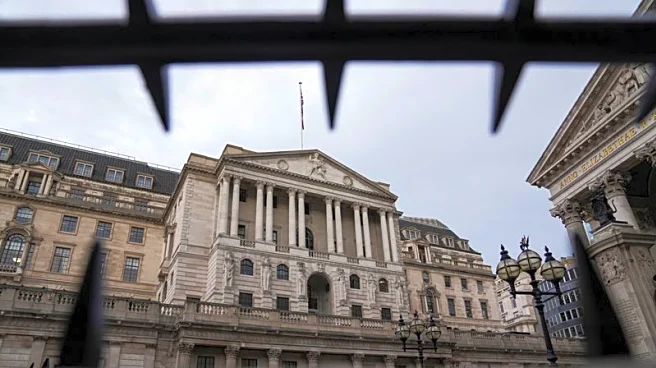LONDON (Reuters) -The Bank of England, which kept interest rates on hold on Thursday in a tight vote, for the first time set out the views of the individual members of its Monetary Policy Committee.
The MPC voted 5-4 to keep borrowing costs at 4%. Deputy governors Sarah Breeden and Dave Ramsden, external MPC members Swati Dhingra and Alan Taylor backed a cut to 3.75%. Most economists polled by Reuters had predicted a 6-3 split to leave Bank Rate unchanged.
Below is a summary of the reasoning behind
the nine policymakers' decisions:
MPC MEMBERS WHO VOTED FOR NO CHANGE
ANDREW BAILEY, GOVERNOR
Bailey said he wanted to confirm that the slowdown in inflation is sustained this year in order to start cutting rates. British consumer price inflation unexpectedly held at 3.8% in September, below the BoE's forecast for a rise to 4%. He said that the current market pricing for rates reflected his position.
"Recent evidence points to building slack in the economy, and the latest CPI data were promising. But this is just one month of data. Labour costs remain elevated and wage growth, while on a downward path of late, may plateau."
"Rather than cutting Bank Rate now, I would prefer to wait and see if the durability of disinflation is confirmed in upcoming economic developments this year."
CLARE LOMBARDELLI, DEPUTY GOVERNOR
Lombardelli said she was worried there might still be underlying inflationary pressures in the economy, despite the recent slowdown in price growth.
"Structural changes in the labour market may mean there is less slack in the economy, leading to more persistent inflationary pressures."
"While I find the ongoing weaker consumption scenario compelling, we have plenty of policy space to lower Bank Rate should it be necessary, while a policy reversal would be costly for the MPC's credibility."
HUW PILL, CHIEF ECONOMIST
Pill judged that the pace of rate cuts so far had been too fast, saying that he preferred a more cautious approach to reducing borrowing costs due to the risks of persistent underlying inflation pressures.
"I continue to prefer a slower pace for the withdrawal of monetary policy restriction than delivered over the past 18 months, reflecting my longstanding concern that structural changes in price and wage-setting behavior have generated stronger intrinsic inflation persistence in the UK, resulting in more sustained above-target underlying inflation."
CATHERINE MANN, EXTERNAL MPC MEMBER
Mann said the cooldown in the labour market was slow, and a firm stance was needed to ensure inflation returns to the BoE's 2% target.
"Administered prices could jump again, elevated household inflation expectations risk further second-round effects, and wage inflation is expected to remain above target-consistent levels next year."
"Monetary policy needs to rein in both inflation and expectations drift so as to reinforce commitment to our 2% target."
MEGAN GREENE, EXTERNAL MPC MEMBER
Greene said she was concerned inflation risks were on the upside, and that the disinflation process in Britain had slowed, with wage growth remaining elevated next year due to firms' increased employment costs.
"I am not convinced the monetary policy stance is meaningfully restrictive. There is huge uncertainty around the neutral rate, but as we approach it the risk of cutting too far or too fast rises and it becomes more difficult to discern whether inflation is driven by the monetary policy stance or underlying dynamics."
MPC MEMBERS WHO VOTED FOR 25 BASIS POINT CUT TO 3.75%
SARAH BREEDEN, DEPUTY GOVERNOR
Breeden voted against the majority for the first time in the November meeting. She said the upside risks to inflation had not materialized and that some slack in the jobs market would continue to weigh down on pay growth.
"Combined with my view that policy remains restrictive and slack continues to build, this gives me enough confidence to cut now."
"We will need a higher accumulation of evidence on disinflation as we feel our way towards neutral next year, where I see benefits in retaining some insurance against potential structural changes in the labour market. But in the absence of conclusive evidence that this is happening, I support gradual policy reduction now."
DAVE RAMSDEN, DEPUTY GOVERNOR
Ramsden said that a gradual pace of reducing rates remained appropriate as the jobs market loosens and uncertainties around the slowdown in inflation dissipate.
"I place weight on our central projection and see risks around it as broadly balanced, although the downside risks are now more prominent to me relative to August, particularly as previous uncertainties around the disinflation process have reduced."
SWATI DHINGRA, EXTERNAL MPC MEMBER
Dhingra said disinflation remained on track and there was limited risk of food price inflation generating second-round effects.
"My view remains that Bank Rate should have been lower already to account for lags in its transmission to the real economy."
"Policy is overly restrictive and could exacerbate risks from weak demand and reduce supply."
ALAN TAYLOR, EXTERNAL MPC MEMBER
Taylor said borrowing costs were too restrictive, and that his outlook was weaker than the central projection, partly due to the slowdown in wage growth and inflation. He said there was a risk that price growth falls below the 2% target.
"I judge that the current slack is larger, and the terminal rate lower, implying that the current stance is more restrictive than intended."
"I place weight on our other models that suggest inflation may not stop falling in the second half of next year and could undershoot."
(Writing by William Schomberg)
















